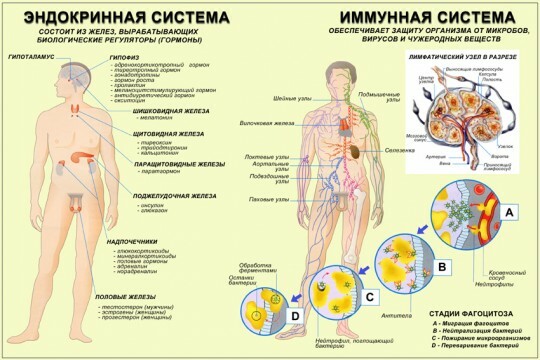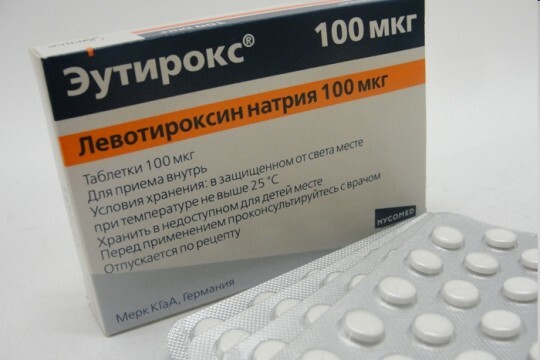The human endocrine system consists of endocrine glands, those that do not have excretory ducts and release hormones into the body. Hormones ensure the normal functioning of cells and tissues, thus performing the function of regulating the normal functioning of the body. The study of endocrine system diseases is carried out by the science of "endocrinology", allocated to a separate branch in connection with a high percentage of pathology.

Among the functions of the system of endocrine glands secrete the following:
- control of adequate functioning of organs and systems, growth and development of the organism;
- participation in chemical reactions of the body;
- stabilization of vital processes;
- ensuring the normal operation of the reproductive system according to gender( sexual) characteristics;
- is responsible for human emotions.
Glands, hormones and their brief description
| Iron | Localization | Produced hormones | Functions | Pathologies in violation of |
| function Thyroid gland. | The anterior surface of the neck. | Thyroxine, Triiodothyronine, Calcitonin | regulation of body growth and development, storage of iodine, stimulation of T cells. T-cells | Zob Hashimoto, diffuse toxic goiter, Dementia |
| Parathyroid glands | On the posterior surface of the thyroid gland | Parathyroid | control of the amount of calcium needed for the proper functioning of the nervous system | Parathyroid osteodystrophy, Hyperparathyroidism |
| Thymus gland | Upper chest, behind the sternum | Timopoetins T-cells | monitor the activity of the immune system; is involved in regulating immunity. | Predominantly autoimmune diseases |
| Pancreas | Behind the stomach, at the level of the first-second lumbar vertebrae | Insulin Glucagon | decreased blood glucose; increased blood glucose levels. Regulation of carbohydrate, fat and protein metabolism | Diabetes mellitus, Insulinoma |
| Adrenal glands | Upper pole of the kidneys | Adrenaline and norepinephrine | Provide emotional reactions, control heart function, increase blood sugar, increase blood pressure | Hyperaldosteronism, Pheochromocytoma;Addison's disease;Diseases of the cardiovascular system( hypertension, myocardial infarction) |
| Testes | Mosson | Testosterone | stimulation of formation and provision of viability of spermatozoa, development of the body by the male type, support of sexual desire | Hypergonadism, hypogonadism |
| Ovaries | Abdominal cavity | Estradiol, progesterone, relaxin | Control of the menstrual cycle and childbirth;the development of secondary sexual characteristics, the formation of the body by the female type. Lowering blood cholesterol levels | amenorrhea, infertility |
| Pituitary | brain Base | Thyroid-stimulating( TSH), Adrenokortiko-tropic( ACTH), Follikulostimu-liruyuschy( FSH), luteinizing( LH), growth hormone( GH), Luteotropic( prolactin), Asparotocin, Vasopressin,( antidiuretic, ADH), Vasotocin, Valitocin, Glamithocin, Isotocin, Mesotocin, Oxytocin. | Action on all endocrine glands, development and functioning of mammary glands, regulation of melanin metabolism, stimulation of ovarian follicle growth | Dwarfism, gigantism, acromegaly, diabetes insipidus, hyperprolactinaemia and other diseases caused by failure of endocrine glands |
| Epiphysis | Brain | Melatonin, Serotonin, Adrenoglomerulo-tropin. | Delays in the production of growth hormones, Suppression of puberty up to a certain age, Sleep and wake control | Insomnia, Depression, Hypertensive disease, Obesity, Type 2 diabetes |
Signs of endocrine disorders in women

Symptoms of diseases affect their diversity, which is not surprising given the number of functions.
But among them there are those on which a person needs to pay attention and immediately consult a doctor.
It is possible to suspect pathology of the pituitary gland with pronounced changes in growth. If there is a violation of the synthesis of growth hormone, the height of the woman will not exceed 120 cm. The first signs are noted around the age of 3 years. Concomitant features: protruding bones of the facial skull( forehead) in combination with a small face, underdevelopment of the genital organs, and later the disorders of the menstrual cycle join.
Dry mouth, persistent thirst, frequent urination. The cause of such symptoms is most often diabetes. The course of the disease in women is somewhat different from that in men. There is an increase or loss of weight( depending on the type of diabetes) for no apparent reason, the presence of a fungal infection,
In acromegaly, first of all, enlargement of the protruding parts of the face is noted, in size the feet and hands are enlarged.
In case of an endocrine system failure, women often have a disorder of the menstrual cycle , accompanied by increased sweating, brittle hair and nails, emotional changes.
Increased synthesis of testosterone. In the female body, the ovaries respond to this hormone. In the case of an increased amount of "male hormone", women notice increased hair growth throughout the body, the hair becomes stiff, darkens. Also, the voice changes, it becomes somewhat rougher. If you do not seek medical help in a timely manner, then the menstrual cycle or its termination occurs. As a result, probably the development of Cushing's syndrome or the formation of ovarian tumors.
To whom to contact?
If you have some common symptoms( high blood pressure, weakness, irritability, numbness of hands and feet), you need to consult a therapist who will prescribe the examination and send it to a specialist.
In case of appearance of several symptoms that allow suspecting the endocrine pathology, it is worthwhile to contact the endocrinologist. Timely treatment contributes to the early diagnosis of the disease and the appointment of adequate treatment.
Survey
There is the concept of "clinical minimum", these are the tests that are assigned to the primary patient. It includes: a clinical blood test, a general urine test, a coprogram, an HIV test, syphilis, and hepatitis.
In case of violations of these indicators, additional tests are prescribed. In particular, if there is a suspicion of a violation of the functions of the endocrine glands, a hormonal study is performed. This includes:
- determining the entry level of a hormone;
- hormonal changes in functional samples or in dynamics( taking into account human biorhythm);
- magnetic resonance imaging or computed tomography;
- ultrasound( with diseases of the pituitary gland, epiphysis, pancreas);
- biopsy( thyroid disease).
And after the verification of the diagnosis, treatment is prescribed.
How to treat?
Exclusively under the supervision of a specialist who prescribes a drug regimen based on many factors - sex, age, research data, the severity of impaired function, the presence of co-morbidities.
As a rule, hormones are prescribed and self-medication in this case can lead to an absolutely undesirable effect.



